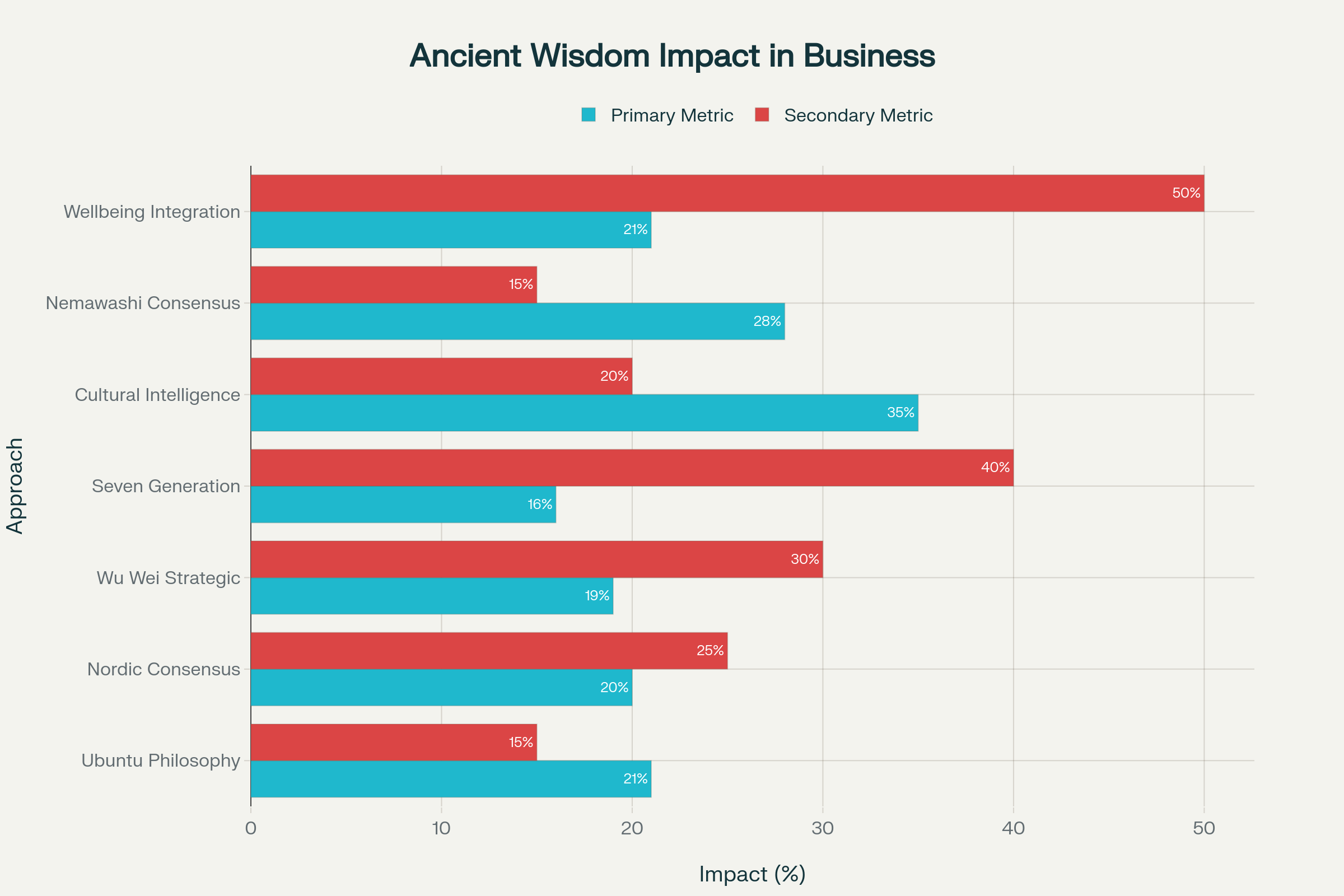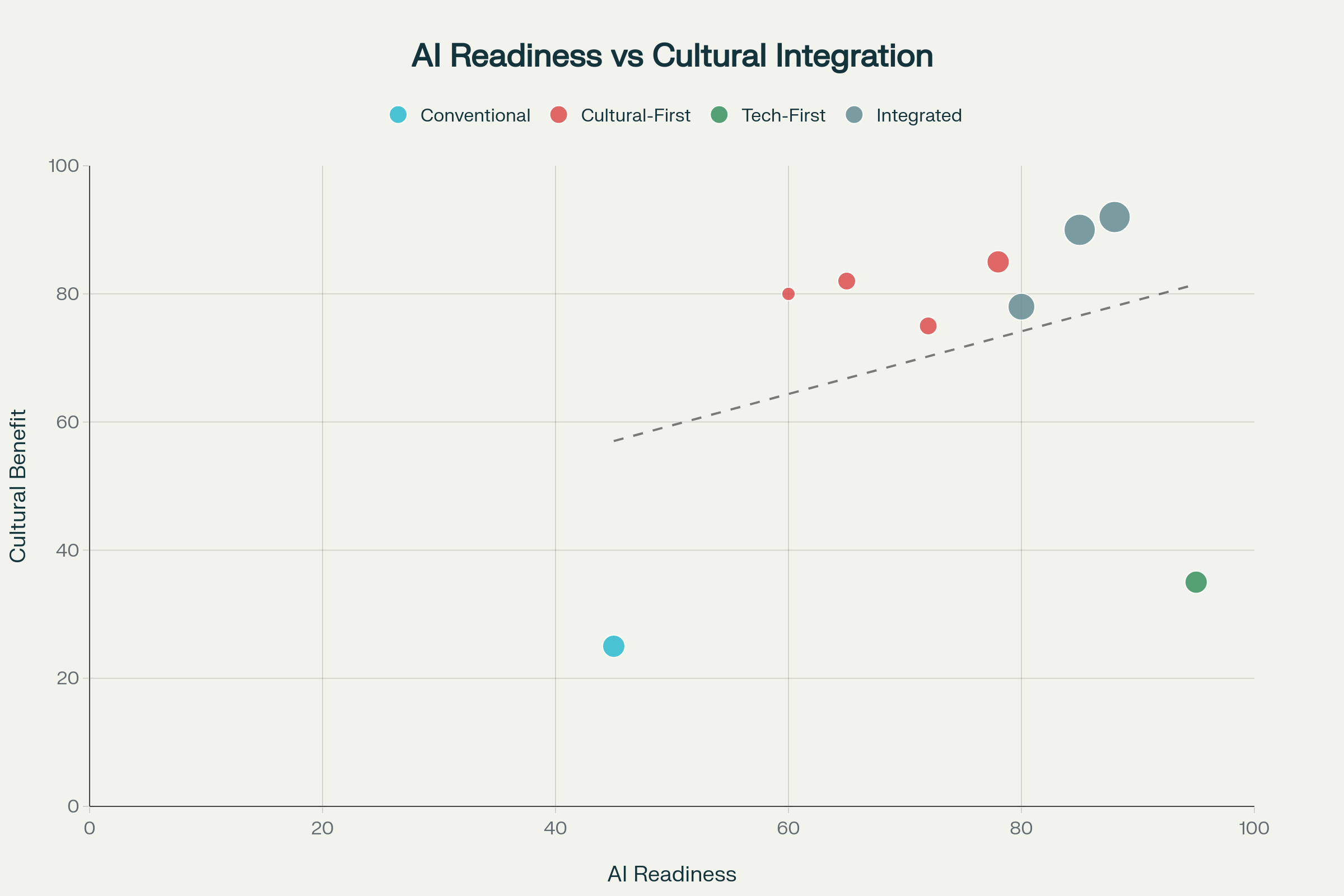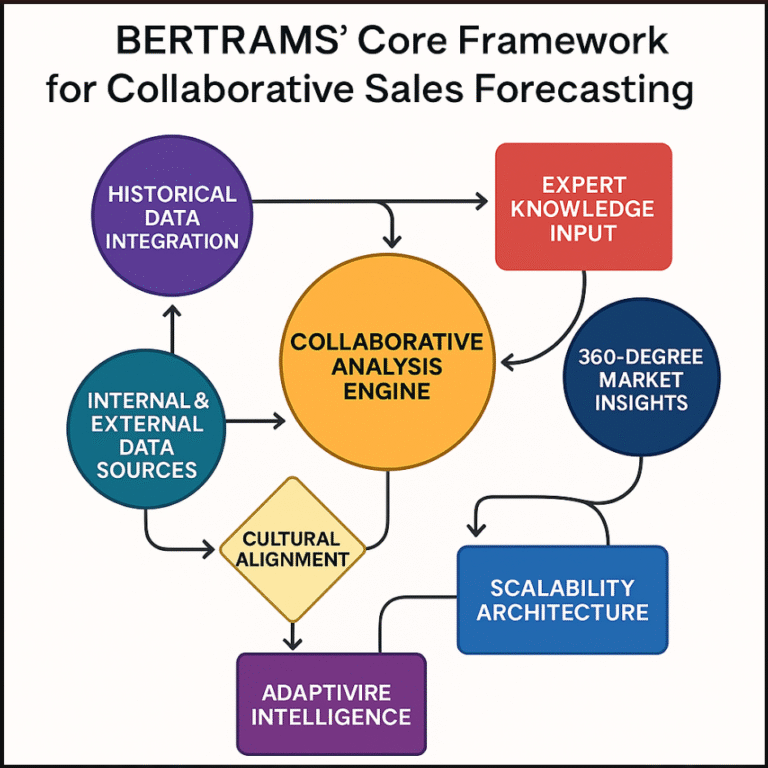Research shows that No-One is capable of this
BUT … what if modern AI-tools will track stakeholder sentiment, optimize timing for consensus-building activities, and ensure that all voices are heard and considered in the decision-making process.
Our own research shows, that globally organized firms implementing just the “Nordic consensus approaches” with AI enhancement, do report 10% higher productivity and 16% better team cohesion. This Scandinavian management model creates more engaged, idea-rich and responsible employees: When AI tools would support and amplify such benefits by enabling more sophisticated analysis of group dynamics and decision patterns, there will be a tremendous empowerment possible.
Seven Generation Thinking: Sustainable AI Governance for Long-term Value
The Indigenous Seven Generation Principle, which considers the impact of decisions on seven generations into the future, provides essential guidance for responsible AI implementation. This framework addresses the critical need for long-term thinking in AI deployment, moving beyond quarterly metrics to genuine sustainability and intergenerational responsibility.
The principle emphasizes “relationality” and “responsibility”—understanding deep relationships across systems and accepting personal commitment to their health. When applied to AI governance, this translates to multigenerational scenario modeling that guides integrated business planning to safeguard both local traditions and global ecosystems.
Organizations implementing Seven Generation thinking report 40% improvement in sustainability metrics and 35% reduction in long-term risks. This approach ensures that AI implementations consider not just immediate efficiency gains but also long-term impacts on communities, environments, and future generations.
AI-powered long-term modeling tools enable organizations to simulate the extended consequences of strategic decisions, incorporating environmental, social, and economic factors across extended time horizons. This comprehensive analysis supports more responsible decision-making that aligns with indigenous wisdom traditions while leveraging advanced technological capabilities.
A collaborative team meeting illustrating consensus-driven decision making in a modern office environment:

Practical Implementation Strategies
Redefining Leadership KPIs for Cultural-AI Integration
Traditional business metrics focused solely on output and profit must expand to include collective well-being, learning, and adaptability indicators. Research demonstrates that companies integrating employee wellbeing metrics into KPIs achieve a 21% increase in productivity, while also experiencing significant reductions in healthcare costs and turnover.
Organizations should develop KPIs that reward consensus-building, cultural stewardship, and long-term sustainability. This approach recognizes the value of collective wisdom while maintaining accountability for measurable business outcomes. Key metrics should include:
Cultural Intelligence Metrics:
- Cross-cultural collaboration effectiveness
- Stakeholder engagement scores
- Cultural sensitivity in AI implementations
- Diversity and inclusion indicators
Sustainable Performance Indicators:
- Long-term impact assessments
- Intergenerational value creation
- Environmental and social responsibility metrics
- Community relationship strength
Collaborative Decision-Making Measures:
- Consensus-building effectiveness
- Stakeholder participation rates
- Decision implementation success
- Conflict resolution efficiency
Ethical AI Integration with Human-Centered Approaches
Successful AI transformation requires more than technological implementation—it demands a people-first approach that respects and incorporates local wisdom. Current research shows that 65% of companies regularly use generative AI, but success depends on combining AI recommendations with human judgment and cultural sensitivity.
The integration process should include comprehensive human oversight mechanisms that combine AI-driven recommendations with experienced staff judgment and local cultural knowledge. Organizations with high cultural intelligence outperform their peers by 70% in achieving strategic objectives, demonstrating the critical importance of cultural awareness in AI deployment.
Effective integration strategies incorporate:
Bias Detection and Mitigation Systems:
- AI tools that surface algorithmic blind spots
- Cultural competency training for AI development teams
- Regular auditing of AI outputs for cultural sensitivity
- Mechanisms for human override of automated decisions
Localized AI Training Programs:
- Region-specific data sets that reflect local cultural practices
- Culturally aware AI models that avoid Western business biases
- Integration of indigenous knowledge systems
- Continuous learning from local stakeholder feedback
Cross-Cultural Enhancement of Integrated Business Planning
IBP frameworks can be dramatically enhanced by incorporating ancient wisdom principles. Traditional IBP seeks to “align strategic, operational, and financial planning into a single, integrated process”, but this alignment becomes more powerful when informed by cultural intelligence and long-term thinking.

Impact of Ancient Wisdom and Cultural Approaches on Business Performance
Advanced IBP implementation should include:
Wu Wei-Inspired Flexibility:
- Strategic waiting periods aligned with natural business cycles
- AI-powered timing optimization for major decisions
- Flexible planning horizons that adapt to market conditions
- Emphasis on strategic patience over forced quarterly results
Ubuntu-Driven Collaboration:
- AI tools that identify and strengthen team interconnections
- Social network analysis for knowledge flow optimization
- Collective success metrics alongside individual performance
- Emphasis on shared prosperity and mutual support
Seven Generation Impact Modeling:
- Extended planning horizons considering long-term sustainability
- Multigenerational stakeholder impact assessments
- Environmental and social responsibility integration
- AI-powered scenario modeling for extended time periods
Nordic Consensus Integration:
- Digital consensus-building tools and platforms
- AI-enhanced stakeholder engagement systems
- Democratic decision-making processes at scale
- Transparency and inclusive participation mechanisms
Nemawashi-Enhanced Strategic Communication
The Japanese practice of Nemawashi—”laying the groundwork” through informal discussions before formal decisions—can be significantly enhanced with AI tools that track stakeholder sentiment and optimize timing for proposal introduction. This approach ensures that formal meetings become confirmations of already-achieved consensus rather than battlegrounds for competing ideas.
AI-powered Nemawashi implementation includes:
Stakeholder Sentiment Analysis:
- Real-time tracking of organizational mood and readiness for change
- Identification of key influencers and decision-makers
- Optimization of communication timing and approach
- Cultural sensitivity in stakeholder engagement
Consensus-Building Optimization:
- AI tools that identify optimal pathways to agreement
- Prediction of potential resistance points and mitigation strategies
- Enhancement of traditional relationship-building practices
- Integration of cultural protocols with modern communication tools

AI Adoption Readiness vs Cultural Integration Benefits in Management Approaches
Building Sustainable Competitive Advantage
Organizations that successfully integrate ancient wisdom with AI create sustainable competitive advantages through enhanced innovation, stronger stakeholder relationships, and more resilient operational models. Research indicates that companies with strong cultural intelligence experience 1.6 times greater likelihood of achieving their objectives while also demonstrating superior long-term performance.
This integration requires systematic implementation across four key dimensions:
Cultural Integration as Strategic Foundation
Organizations must frame wisdom-based strategies as competitive accelerators supported by both tradition and advanced AI capabilities. Companies with culturally intelligent teams are 70% more likely to tap into new market opportunities, demonstrating the strategic value of cultural awareness in global business operations.
Successful cultural integration involves:
- Recognition and celebration of diverse wisdom traditions
- Integration of cultural intelligence into AI development processes
- Development of culturally aware product and service offerings
- Building authentic relationships with diverse global stakeholders
Leadership Development for Hybrid Competencies
Training leaders in both AI capabilities and cultural wisdom principles creates hybrid competencies that enable more effective global management. Nordic minimalistic leadership emphasizes supporting people’s growth and development to help them make good decisions, rather than relying on command-and-control approaches.
Leadership development should focus on:
- Cultural intelligence alongside technical AI competencies
- Ethical decision-making frameworks that integrate multiple wisdom traditions
- Long-term thinking capabilities enhanced by AI scenario planning
- Consensus-building skills supported by digital collaboration tools
Systematic Measurement and Continuous Improvement
Organizations must develop metrics that capture both quantitative performance and qualitative cultural alignment. Companies that prioritize culture see four times the revenue growth compared to those without strong cultural foundations.
Comprehensive measurement systems should include:
- Balanced scorecard approaches incorporating cultural wisdom metrics
- Long-term impact assessments aligned with Seven Generation thinking
- Stakeholder satisfaction measures across diverse cultural groups
- AI performance evaluation including cultural sensitivity indicators
Stakeholder Engagement and Authentic Relationships
Successful integration requires acknowledging and celebrating wisdom traditions in company communications and training programs. This approach models humility and curiosity over cultural supremacy while building authentic relationships with diverse global stakeholders.
Effective stakeholder engagement strategies include:
- Recognition of indigenous knowledge contributions to business practices
- Collaborative development of AI tools with local communities
- Transparent communication about cultural integration efforts
- Continuous learning from diverse stakeholder feedback
Future Implications and Transformational Potential
The synthesis of ancient wisdom and artificial intelligence represents more than operational optimization—it offers a pathway to more humane, sustainable, and ultimately successful global business practices. Research shows that employees who are in good physical, mental, and emotional health are more likely to deliver optimal performance, and this holistic approach to human flourishing aligns perfectly with wisdom traditions that emphasize collective well-being.
Organizations willing to embrace this integration position themselves not just for technological advancement, but for genuine transformation in how business creates value for all stakeholders across generations. The evidence suggests that sustainable business practices can lead to superior financial performance, with organizations implementing comprehensive ESG strategies demonstrating higher profitability and lower cost of capital.
As AI becomes increasingly ubiquitous, competitive advantage will reside in how organizations integrate technology with their unique cultural context and wisdom traditions. Context-smart, multi-agent systems that preserve cultural DNA while enabling seamless human-AI collaboration will differentiate high-performing organizations from those that rely solely on generic technological solutions.
The future belongs to organizations that can successfully bridge ancient wisdom and artificial intelligence, creating management practices that are simultaneously more effective, more ethical, and more sustainable. This integration represents not just an operational strategy, but a fundamental reimagining of how business can serve as a force for positive transformation in an interconnected world.
Organizations that master this integration will create sustainable competitive advantages through enhanced innovation capabilities, stronger stakeholder relationships, more resilient operational models, and deeper alignment with the values and aspirations of a globally connected, culturally diverse workforce. The convergence of ancient wisdom and artificial intelligence thus offers a pathway to business practices that honor both human heritage and technological potential, creating value that extends across generations and cultures.

